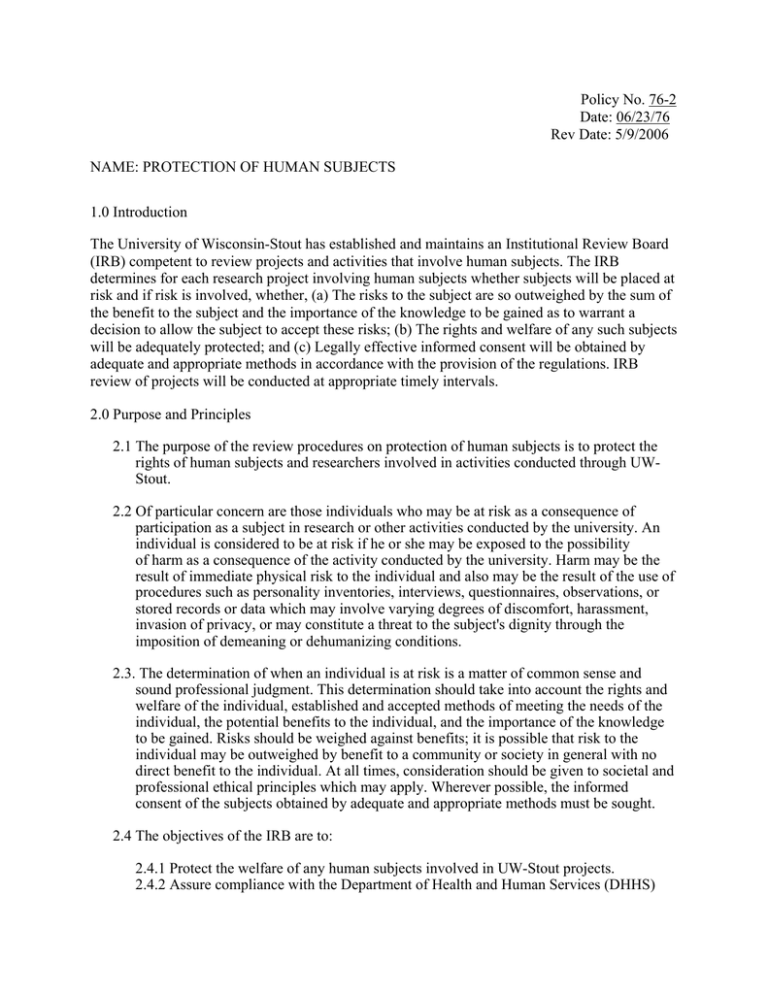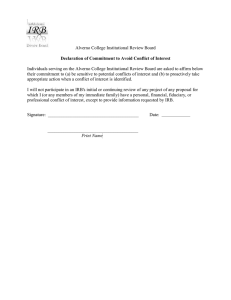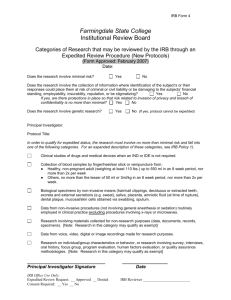Policy No. 76-2 Date: 06/23/76
advertisement

Policy No. 76-2 Date: 06/23/76 Rev Date: 5/9/2006 NAME: PROTECTION OF HUMAN SUBJECTS 1.0 Introduction The University of Wisconsin-Stout has established and maintains an Institutional Review Board (IRB) competent to review projects and activities that involve human subjects. The IRB determines for each research project involving human subjects whether subjects will be placed at risk and if risk is involved, whether, (a) The risks to the subject are so outweighed by the sum of the benefit to the subject and the importance of the knowledge to be gained as to warrant a decision to allow the subject to accept these risks; (b) The rights and welfare of any such subjects will be adequately protected; and (c) Legally effective informed consent will be obtained by adequate and appropriate methods in accordance with the provision of the regulations. IRB review of projects will be conducted at appropriate timely intervals. 2.0 Purpose and Principles 2.1 The purpose of the review procedures on protection of human subjects is to protect the rights of human subjects and researchers involved in activities conducted through UWStout. 2.2 Of particular concern are those individuals who may be at risk as a consequence of participation as a subject in research or other activities conducted by the university. An individual is considered to be at risk if he or she may be exposed to the possibility of harm as a consequence of the activity conducted by the university. Harm may be the result of immediate physical risk to the individual and also may be the result of the use of procedures such as personality inventories, interviews, questionnaires, observations, or stored records or data which may involve varying degrees of discomfort, harassment, invasion of privacy, or may constitute a threat to the subject's dignity through the imposition of demeaning or dehumanizing conditions. 2.3. The determination of when an individual is at risk is a matter of common sense and sound professional judgment. This determination should take into account the rights and welfare of the individual, established and accepted methods of meeting the needs of the individual, the potential benefits to the individual, and the importance of the knowledge to be gained. Risks should be weighed against benefits; it is possible that risk to the individual may be outweighed by benefit to a community or society in general with no direct benefit to the individual. At all times, consideration should be given to societal and professional ethical principles which may apply. Wherever possible, the informed consent of the subjects obtained by adequate and appropriate methods must be sought. 2.4 The objectives of the IRB are to: 2.4.1 Protect the welfare of any human subjects involved in UW-Stout projects. 2.4.2 Assure compliance with the Department of Health and Human Services (DHHS) human subjects guidelines. 2.4.3 Minimize liability of individual principal investigators at UW-Stout and projectsponsoring agencies. 2.4.4 Assist principal investigators in developing and implementing effective human subjects procedures for their projects. 2.4.5 Educate researchers on the rights of human subjects and the responsibilities of the researcher. 3.0 Composition of Institutional Review Board, Protection of Human Subjects The committee shall be composed of members of varying backgrounds to assure complete and adequate review of projects and activities conducted through UW-Stout. Committee membership will follow IRB committee membership guidelines. (see Appendix A for committee membership guidelines) 4.0 Statement of Policy and Procedures To protect the rights of human subjects, proposals that meet the federal definition of research must go through the IRB review process prior to the initiation of the research. The researcher determines whether the project meets the definition of research by using information available on the human subjects web page. If the researcher determines that the project does not meet the federal definition of research, it does not have to go through the IRB review process. The IRB will follow general procedures outlined in Appendix B. 5.0 Records 5.1 UW-Stout will maintain records of all submitted protocols and actions taken on those protocols, including all attachments and related documents according to federal guidelines. The Research Services office will keep records of IRB meeting minutes, government guidelines and written procedures and policies relating to the IRB. Research Services will keep a list of all UW-Stout faculty, staff and students who have completed human subjects training. 5.2 The IRB will assess its policies and procedures at least every three years and make any appropriate changes, including changes to keep the IRB consistent with UW-Stout and DHHS regulations. Appendix A: Composition of Institutional Review Board, Protection of Human Subjects Appendix B: Institutional Review Board Review Process Appendix A. Composition of Institutional Review Board, Protection of Human Subjects The committee shall be composed of 13 members of varying backgrounds to assure complete and adequate review of projects and activities conducted through UW-Stout. Membership: • Two members from each academic college • Three members from Student Services, Administrative and Student Life Services or University Relations • Two community members Committee members should be selected on the basis of their experience, interest, and expertise and should be able to determine acceptability of projects and activities in terms of professional competence, institutional regulations, applicable law, standards of professional conduct and practice, and community attitudes. At least one member will come from a scientific area and at least one member will come from an area other than the sciences. Committee members must have completed the UW-Stout human subjects training. The Chairperson of the committee will be elected at the last meeting in the spring for a two-year term. The elected Chair must have served on the IRB for at least one academic year. The ViceChair will be elected at the first meeting in the fall for a one-year term. Temporary replacement of a committee member by an alternate of comparable experience and competence may be made if a member is temporarily unable to fulfill committee responsibility. The individual will be approved by the IRB. Temporary service by an individual with specialized experience and competence may be made to ensure complete and adequate review in case a particular proposal or activity outside the scope of activities commonly conducted by the university is made. This individual may not vote with the IRB but serves in an informational role. This individual will be selected by the chair with input from the IRB and/or the greater Stout community. Appendix B. Institutional Review Board Review Process Steps of IRB review: To protect the rights of human subjects, the IRB will review all procedures for use of human subjects in all research being conducted through UW-Stout. All proposals involving human subjects that meet the federal definition of research must be reviewed by the IRB prior to initiation of the research. The IRB follows these general procedures: A protocol form available on the Research Services website must be prepared by the researcher for each proposal that meets the federal definition of research. Each protocol is reviewed for: the federal definition of research, inclusion of human subjects, exemption from review, expedited review and full board review. 1. Definition of "research": Research is defined by the Department of Health and Human Services (DHHS) as follows; "Research means a systematic investigation, including research development, testing and evaluation, designed to develop or contribute to generalizable knowledge. Activities which meet this definition constitute research for purposes of this policy, whether or not they are conducted or supported under a program which is considered research for other purposes. For example, some demonstration and service programs may include research activities." -45 Code of Federal Regulations §46.102(d) 2. A protocol form must be completed by the researcher and routed to Research Services for all projects that the researcher determines meet the federal definition of research. 3. Involvement of human subjects: If human subjects are involved, the IRB must review the proposed procedures. A human subject is defined as "a living individual about whom an investigator (whether professional or student) conducting research obtains (1) data through intervention or interaction with the individual, or (2) identifiable private information." This step involves only a determination of whether human subjects are involved. If they are involved, it is the responsibility of the IRB to determine whether they are actually at risk. 4. Review for exemption: Research that is exempt from IRB review as set forth in the Office of Human Research Protection (OHRP) guidelines §46.101(b) must go through the proposal submission process. Researchers should submit a protocol form and should note that they wish the IRB reviewers to consider whether or not the proposed project is exempt from review. Research designated as exempt from review maintains exempt status for five years provided approved procedures are followed. 5. Expedited Review: If risk is minimal and the research belongs to one of the categories designated by OHRP as appropriate for expedited review, the protocol may be reviewed through the expedited review procedure. Expedited review involves review by one or more IRB members and can usually be completed within ten days. 6. Full board review: If the research involves more than minimal risk, does not belong to the categories designated by OHRP, or the reviewer of an expedited protocol feels the protocol requires full board review, then the protocol will be reviewed by the full IRB committee at the monthly meeting. Meetings are held monthly during the academic year and during the summer as needed. The IRB will meet to act upon items submitted for consideration. A quorum consisting of more than 50% of the IRB members must be present at the meeting, or members must submit a vote in writing, for any action to be taken officially. No member of the committee may be involved in either the initial or continuing review of activity in which he or she has a professional responsibility except to provide information as requested by the committee. 7. Notice of IRB action: Research Services will provide notice of a project's approval, modification, or disapproval. If the proposal is being supported by federal funds, the IRB administrator shall provide notification to the funding agency of the project's approval by the IRB. IRB approval of non-exempt research is valid for one year. IRB approval of exempt research is valid for 5 years. Requirements for Informed consent: All protocols must include a method for obtaining informed consent. The IRB must approve the informed consent statement and procedures as part of the review process outlined above. Sample consent forms are available from the Research Services website. Responsibilities of the investigators: The principal investigator is responsible for ensuring that the project is adhering to the procedures approved by the IRB. The principal investigator should contact the IRB on his or her own initiative should problems arise or changed procedures require re-approval by the IRB. Requirements for re-approval/renewal: Significantly changed procedures require re-approval by the IRB. If research continues after the expiration date, the principal investigator is responsible for submitting a renewing protocol and getting a renewed approval of the research project prior to the expiration date. A renewing protocol is a form explaining the changes to the original protocol. It is submitted via email to the Research Services office. Review for Classroom projects: Research projects conducted by students as part of a course may not require review. Courserelated research is not subject to IRB review if all of the following are true. If at least one of the following is not true, the research must follow the IRB review process outlined above: · The project is limited to surveys / questionnaires / interviews / observations of public behavior directly related to topics being studied in an official university course. · The above surveys/questionnaires, etc. contain no sensitive personal questions (e.g., no questions about drug use, sexual behavior or attitudes, criminal activity, grades, medical history) or other personal information that could stigmatize an individual. · The participants in the project are not from a vulnerable or special population (e.g., pregnant women, prisoners, minors, cognitively impaired individuals). · Either no identifying information is recorded to link a person with the data, or if identification is possible, no questions are being asked or information being collected that could reasonably harm the individual's reputation, employability, financial standing, or place them at risk for criminal or civil liability. · The collected data does not leave the classroom setting, or if the project involves collecting data on an organization, agency or company, the data are shared only with that entity. · No UW-Stout employee or student is receiving financial compensation for collecting, organizing, analyzing, or reporting the data. The complete UW- Stout IRB guidelines on classroom research can be found on the Research Services website.




